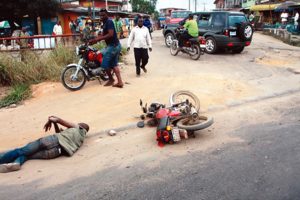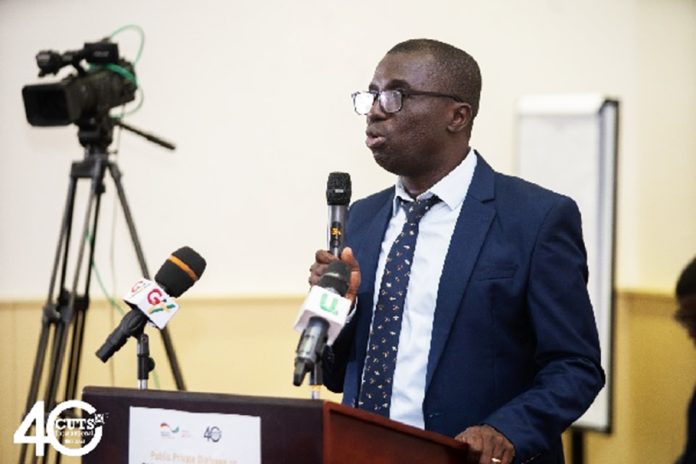CUTS International, a leading policy research and consumer advocacy organisation has called on the Government to declare road safety a national public health emergency, following the alarming spike in road traffic fatalities and injuries recorded in the first half of 2025.
Addressing a news conference in Accra yesterday, Mr Appiah Kusi Adomako, West Africa Regional Director of CUTS International, expressed grave concern over the growing national tragedy unfolding daily on Ghana’s roads.

“Travelling on our roads today requires fasting, prayer and courage,” he said, adding “it is no longer just a transport issue. It is a public health crisis, a development challenge and a national security threat. Road crashes are killing more Ghanaians than pandemics.”
Startling Statistics from 2025
Between January and June 2025, Ghana recorded 7,289 road crashes involving 12,354 vehicles resulting in 1,504 deaths and over 8,300 injuries, according to data from the Ghana Police MTTD and the National Road Safety Authority (NRSA). Additionally 1,301 pedestrians were knocked down during this period.
This marks a 22 percent rise in deaths and a 10 percent increase in injuries compared to the same period in 2024. The Ashanti Region emerged as the most fatal, recording 60 deaths in June alone, followed by the Eastern Region with 46 deaths, and Greater Accra, which saw a slight reduction from 27 deaths in June 2024 to 22 in June 2025.
“These are not just numbers. Each one represents a human life, a loved one, a breadwinner, a student, a worker whose future was stolen and whose absence now leaves a void in their families and communities,” Mr Appiah Kusi Adomako said.
Road Crashes Now Deadlier Than COVID-19
Drawing a sharp comparison, Mr. Adomako noted that the total number of confirmed COVID-19 deaths in Ghana since the start of the pandemic stands at 1,462. In contrast, road crashes have claimed 1,504 lives in just six months.
“This crisis has surpassed COVID-19 in the number of lives lost, yet our national response remains sluggish. Imagine what could be achieved if road safety received even 20 percent of the attention and funding allocated to COVID-19.”
Vulnerability of Two- and Three-Wheelers
Motorcycle and tricycle accidents continue to dominate crash data. In June 2025, motorcycles accounted for 73 percent of cycle-related crashes (381 incidents), while tricycles made up 24 percent (123 incidents), and bicycles 2 percent (9 incidents).
Recommendation to Government and Stakeholders
To address this escalating crisis, CUTS is called on the government and all stakeholders to consider implementing the following measures:

Declare Road Safety a Public Health Emergency: The President and Parliament must recognise road traffic crashes as a national emergency, equivalent to pandemics and natural disasters. This will allow for better resource allocation, institutional coordination and heightened public awareness.
Amend the Road Traffic Regulations (L.I. 2180): Legal reforms are needed to effectively regulate the operations of motorcycles and tricycles used for commercial transport. This includes setting minimum training requirements, safety gear standards and licensing protocols.
Reform Blood Alcohol and Safety Laws: The current Blood Alcohol Content (BAC) legal limit must be lowered from 0.08 percent to 0.05 percent, in line with WHO recommendations. Additionally, laws on seat belts, child car seats and motorcycle helmets must be strictly enforced and updated to reflect modern safety standards.
Expand DVLA Training and Licensing to High-Risk Districts: The DVLA must strengthen its services, especially in rural and peri-urban areas where informal transport is growing.
Intensify Enforcement in High-Fatality Regions:
The Motor Traffic and Transport Department (MTTD) should be empowered with more personnel, logistics and technology to enforce traffic rules in the Ashanti, Eastern and Greater Accra Regions, which are the most affected.
Deploy Smart Traffic Monitoring Systems: Government should invest in intelligent traffic technologies, such as automated number plate recognition, speed cameras and red-light enforcement systems, to enhance deterrence and accountability on the roads.
Revamp Public Education Campaigns: Mass education must go beyond traditional media. NRSA should lead nationwide road safety education campaigns targeting schools, markets, lorry parks and religious centres. Local languages and community influencers must be engaged.
Operationalise Speed Limiter Regulations: Existing laws requiring commercial vehicles to be fitted with speed limiters must be fully enforced. Periodic inspections must be carried out to ensure tamper-proof compliance.
Strengthen NRSA Pre-Departure Inspections: NRSA must increase its presence at major transport terminals and highways, ensuring that vehicles undergo mandatory safety checks before setting off, especially during holidays and weekends.
Establish Road Safety Units in Every District Assembly: Each district should have a dedicated unit responsible for identifying and managing local road hazards.
Regulate Billboard Placement Through MMDAs: Local authorities must ensure that billboards and advertisements do not obstruct driver visibility or distract road users. Dangerous or illegal signage must be taken down immediately with the support of the police.
Improve Coordination Among Key Agencies: There must be seamless collaboration between NRSA, MTTD, DVLA, and Metropolitan, Municipal and District Assemblies (MMDAs).
Allocate 5 Percent of the Road Fund to NRSA: Road safety efforts are underfunded. Government should legislate that 5 percent of the Road Fund be dedicated to NRSA activities, with timely disbursement to allow for effective planning and implementation.
Strengthen Emergency Response Systems: Road crash victims often die due to delayed medical help. Ghana must improve its ambulance coverage, create rapid response teams and train first responders in basic trauma care to prevent secondary fatalities.
“If we do not act now, we are complicit in the next tragedy. CUTS stands ready to support government through research, advocacy and community engagement. But we need political will, coordination and urgency,” Mr Adomako said.
He further warned that Ghana’s vision of building a 24-hour economy would be undermined if workers, goods and services cannot move safely and confidently at any hour of the day.
“No one will work at night if the roads are death traps. Road safety is as important to a 24-hour economy as power and internet access.”
CUTS International called on the media, civil society, faith leaders, traditional authorities and the general public to unite behind a national campaign to make Ghana’s roads safe. “Road safety is a consumer protection issue. It is a public health issue. It is a development issue. It is a national security issue. We must treat it as such,” Mr Appiah Kusi Adomako concluded.









